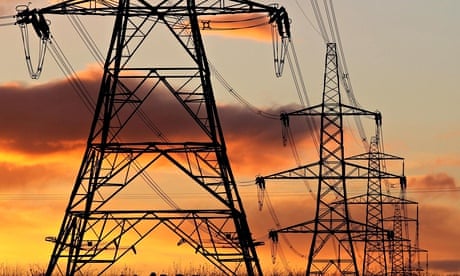The price of electricity could double over the next two decades, according to forecasts published on Thursday by the National Grid, the company responsible for keeping Britain's lights on.
The current price of wholesale electricity is below £50 per megawatt hour but could soar to over £100 by 2035 under a "high case" example used in the Grid's UK Future Energy Scenarios report.
The group, which is the main pipes and pylons operator in England and Wales, predicts the wholesale gas price could rise from 70p per therm to around 100p per therm under another high case scenario.
The cost of electricity has already risen 20% since 2009 and the company blames future increases on the number of coal-fired power stations being closed plus the cost of subsidising wind farms.
"Electricity prices for the high case and base case scenarios are assumed to increase over the next few years due to decreasing margins as coal-fired plants retire due to the Large Combustion Plants Directive [European anti-pollution] legislation and some gas-fired plants are mothballed," says the document. "All prices increase post-2020 as the costs of low carbon generation increasingly factor into the power price," it adds.
The Grid admits the estimates are based on the lowest "baseload" cost at which the electricity is available rather than any "peak" costs during periods of high demand.
The latest forecasts – although combined with more modest price rises under different scenarios – will worry householders and energy-intensive businesses already struggling with the impact of higher bills.
The government has found itself caught in an awkward bind of needing to offer incentives to draw in investors to replace polluting coal and ageing nuclear plants at a time when it tries to meet higher carbon reduction targets.
A slump in North Sea gas and oil production due to fields running dry has also encouraged the government to support a controversial shale gas drive in a bid to match a US boom in this kind of fuel.
The Grid now says that more than 40% of Britain's gas needs could under some circumstances be met by indigenous shale extraction by 2035, but declined to say whether it would have any impact on prices.
The company says failure to invest much more in local gas production, whether onshore or in the North Sea, would leave the country 90% dependent on imports within two decades.
In previous years the Grid has made no real assessment of the power of shale gas in Britain to affect the wider energy landscape, but a spokesman said it was time to do so given the data now available from the British Geological Survey and others.
"We have a lot more information on shale gas on which to base our assumptions, which range from providing zero under the 'no progression' scenario up to 41% by 2035 in a 'low-carbon life scenario'," said a spokesman for the Grid.
The possible rise in future electricity prices to over £100 could help justify government plans to pay £89.50 per megawatt hour subsidy or "strike price" to EDF Energy to produce electricity from a proposed new nuclear power plant at Hinkley Point in Somerset from 2023.






Comments (…)
Sign in or create your Guardian account to join the discussion